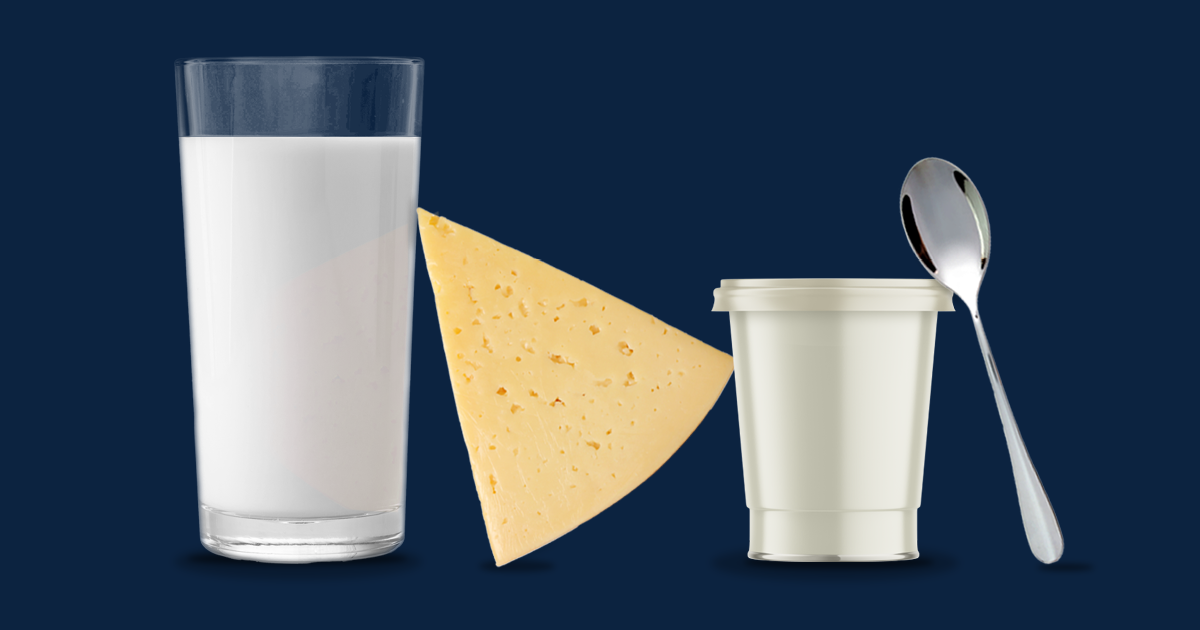
Weight management
Some people avoid dairy foods because of the belief these foods will lead to weight gain. In fact, research shows milk, cheese and yoghurt are protective against weight gain and obesity. Studies show milk, cheese and yoghurt can even help with weight reduction as part of a weight-loss diet.
Eating dairy foods is not linked with weight gain
In developing the Australian Dietary Guidelines , the National Health and Medical Research Council (NHMRC) reviewed the body of evidence published between 2003 and 2009 for the relationship between weight and eating milk, cheese and yoghurt. The review found no link between eating these foods and weight gain or risk of obesity in adults.1
Studies published since the NHMRC’s review continue to show a neutral effect of these dairy foods on weight. Two recent meta-analyses collated results from numerous randomised controlled trials from the 1960s to 2012. Both found including at least three serves of dairy foods such as milk, cheese and yoghurt in an everyday diet was not linked to weight gain compared to individuals eating a habitual diet with lower amounts of dairy foods. Lower intake was characterised by less than two serves to less than one serve per day.2, 3
Eating dairy foods can help with weight loss
In kilojoule-controlled weight loss studies, two meta-analyses showed including at least three daily serves of milk, cheese and yoghurt resulted in:
- Greater weight loss
- Increased muscle mass
- Reduced fat mass
- Reduced waist circumference.
These results were identified when compared to diets which excluded adequate daily serves of these dairy foods.
People can feel confident that including milk, cheese and yoghurt in a healthy, balanced diet and exercise program will not lead to weight gain. It can in fact lead to better results.
Explaining the results
There are four reasons that might explain the beneficial effects of dairy foods within weight-loss diets. It is likely to be a combination of the following four effects:
- Dairy calcium may reduce the amount of dietary fat absorbed by the body.4
- Insufficient calcium intake promotes regulatory changes that can reduce fat mobilisation and oxidation (i.e. people tend to burn less fat when they have a low calcium intake).5
- Some studies suggest dairy foods may help to reduce feelings of hunger and the desire to eat.6
- Dairy foods are a source of protein which has a well-known positive role in weight loss.
If people are already overweight, should they really increase their dairy intake?
To achieve and maintain a healthy weight, the 2013 Australian Dietary Guidelines encourages people to choose nutritious foods from the five food groups (including milk, cheese and yoghurt). Another recommendation is to limit discretionary foods (or ‘junk’ foods), which are often high in kilojoules and low in nutrients.
Discretionary foods contribute excessively to the energy intake of Australians. In the 2011–2012 Australian Health Survey it was estimated that discretionary foods accounted for 35% of total energy intake.7 Eating less of these foods allows nutritious foods, commonly lacking in the diet, to be accommodated within appropriate energy intakes.
Weight and body fat loss can be enhanced by including three to four daily serves of milk, cheese and yoghurt. This change must be in the context of a healthy, balanced diet as recommended in the Australian Dietary Guidelines.
An Accredited Practising Dietitian will be able to help with a personalised weight management plan.
Visit the Australian Dietary Guidelines to help patients take immediate steps towards healthier eating.
Dairy and weight management resources
Dairy and weight fact sheet
Download the Healthy weight fact sheet
Dairy and weight infographic
Download the Health benefits of dairy infographic
Dairy and weight recipe books
Download the Healthy recipes cookbook
1 National Health and Medical Research Council. Australian Dietary Guidelines, Canberra: Commonwealth of Australia; 2013.
2 Abargouei A, Janghorbani M, Salehi-Marzijarani M, Esmaillzadeh A. Effect of dairy consumption on weight and body composition in adults: a systematic review and meta-analysis of randomized controlled clinical trials. Int J Obes Relat Metab Disord. 2012;36(12):1485-93.
3 Chen M, Pan A, Malik V, Hu F. Effects of dairy intake on body weight and fat: a meta-analysis of randomized controlled trials. Am J Clin Nutr. 2012;96(4):735-47.
4 Christensen R, Lorenzen J, Svith C, Bartels E, Melanson E, Saris W et al. Effect of calcium from dairy and dietary supplements on faecal fat excretion: a meta-analysis of randomized controlled trials. Obes Rev. 2009;10(4):475-86.
5 Gonzalez J, Rumbold P, Stevenson E. Effect of calcium intake on fat oxidation in adults: a meta-analysis of randomized, controlled trials. Obes Rev. 2012;13(10):848-57.
6 Tremblay A, Gilbert J. Human obesity: is insufficient calcium/dairy intake part of the problem?. J Am Coll Nutr. 2011;30(sup5):449S-53S.
7 Australian Bureau of Statistics [Internet]. Canberra: ABS; 2015. Australian Health Survey. Available: https://www.abs.gov.au/statistics/health/health-conditions-and-risks/australian-health-survey-nutrition-first-results-foods-and-nutrients/latest-release#discretionary-foods

